Huh? Is That a Universal Word?
By N. J. Enfield
Languages from all over the world seem to have developed the same sound to indicate confusion and to initiate conversation repair.
Languages from all over the world seem to have developed the same sound to indicate confusion and to initiate conversation repair.

In a village of the riverine plains of central Laos, a man calls out through thin bamboo walling to a next-door neighbor named Noi: Noi bòò mii sùak vaa Noi (“Noi, do you have any rope Noi?”). She calls back: Haa? (“Huh?”). The man repeats the question: Bòò mii sùak vaa (“Do you have any rope?”).
In a hillside hamlet in central Eastern Ghana, two speakers of the minority language Siwu are preparing gunpowder, which will be sold for use at a funeral in another village. One man asks: Ilɛ̀ isɛ̀-ɛ? (“Where is the funeral?”). The other: Hã? (“Huh?”). The first: Ilɛ̀ isɛ̀-ɛ? (“Where is the funeral?”).
In the coastal lowlands of northwestern Ecuador, two Cha’palaa speakers exchange information. Motorkaa detisaa (“They say he bought a motor.”). Aa? (“Huh?”). Motorkaa detisaa (“They say he bought a motor.”).
This same sequence of other-initiated repair (the process of requesting clarification from someone else) is found in daily conversation in every household, village, town, and city of the world, regardless of the culture and lifestyle of the people or the language they speak. But in these three examples, something more is going on. Not only does each of the languages have a way of doing this type of repair initiation, but the word used for doing it sounds almost the same in all corners of the world. It sounds very much like the English word Huh?
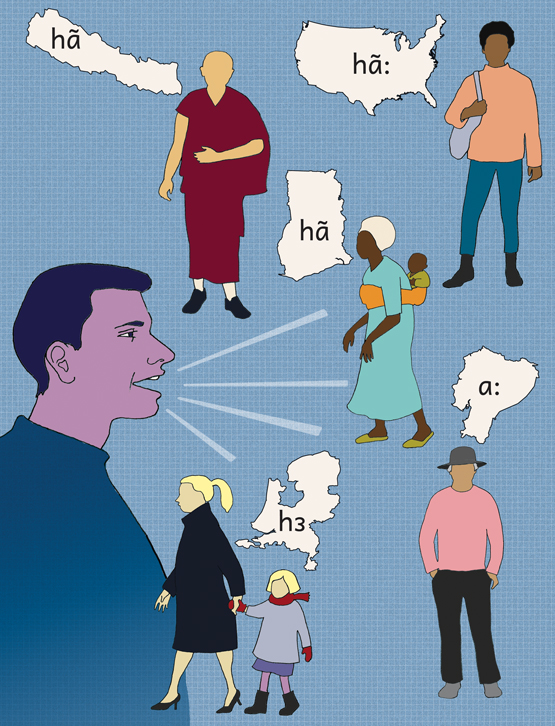
Barbara Aulicino
Members of our research team initially saw the possibility that Huh? was a universal word in the context of a large cross-language project on repair in conversation—the process of identifying and correcting a misunderstanding. We were focused on how people deal with misunderstandings in language. In a preliminary phase of group research, we were struck by a repeated observation. In all the languages for which we had data, people were saying something that sounds pretty much like English Huh? and has pretty much the same function. This observation led us to ask: Could Huh? be a universal word?
To really know for sure whether Huh? was universal, we would have to check every single one of the 6,000 or so languages spoken in the world today. This task is of course required for any of the proposed universals of language that you’ll come across in linguistic research. The linguist Anna Wierzbicka of the Australian National University argues that a small set of around 60 word meanings are universal. Every language, she says, has a clear way to express simple concepts including good, all, people, and you. The linguist Robert M. W. Dixon of James Cook University argues that every language has adjectives, a class of words that are distinct from nouns and verbs. And the linguist Noam Chomsky of the University of Arizona argues that recursion—taking the output of a process and using it as input for the same process again—is found in the grammatical structure of all languages.
When these linguists give evidence for their claims, they can cite only a small subset of the world’s languages. But they still are able to state that something is highly likely to be universal, as long as no counterexamples have so far been found. This practice is accepted because linguistics is an inductive science. As linguists gather information about what is possible in the different languages of the world, they can become more certain about what they will find, or not find, in languages they haven’t looked at yet. That said, they must always be open to finding new information that disproves their claims.
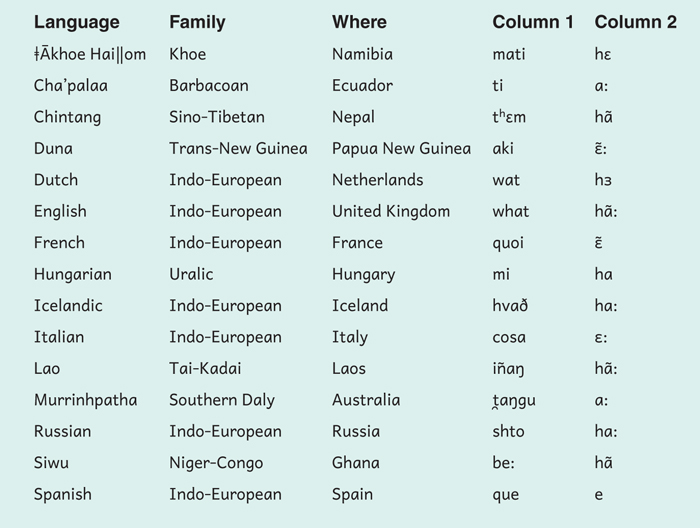
International Phonetic Association / CC-BY-SA
The table above shows weak repair initiators in 15 languages— nonspecific words used to indicate a problem of understanding (strong repair initiators, such as who, where, and when, are more specific). All the words in both columns 1 and 2 can be used for the same general function as Huh? The words in column 1 are all questioning words that mostly mean what, or sometimes words that mean how can be used for this function, as in the optional forms in Italian (Come?), German (Wie?), and French (Comment?). These words sound completely different across languages: Compare what in English, shto in Russian, and aki in Duna (a language of highland Papua New Guinea). These wide-ranging sounds are what we expect to find when we compare words from different languages: For example, the words for dog in the same three languages are: English (dog), Russian (sobaka), and Duna (yawi).
In column 2 of the table, something different is going on. There is an uncanny resemblance between these words.
All spoken languages use vowel sounds. They each draw on the same human set of possibilities. In linguistics, the possibilities for vowel sounds in human languages are laid out on a grid with two axes: front-to-back and close-to-open (see the figure below). Each phonetic symbol on the chart represents a vowel sound that is used in at least one human language.
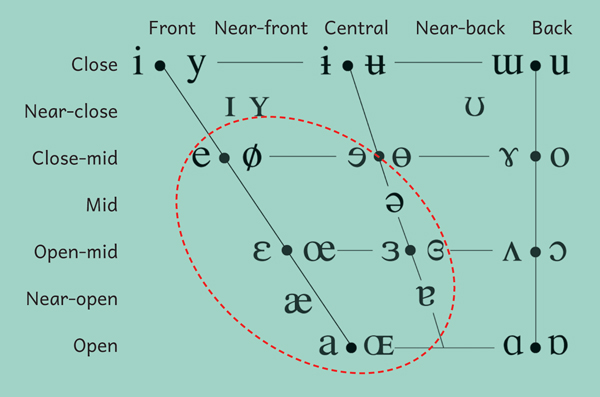
International Phonetic Association / CC-BY-SA
The what words in column 1 of the table above use vowel sounds from all over this chart. But our observation of 31 languages showed that in the expressions corresponding to Huh?, not a single language used a sound from outside the open-front quadrant of the space.
Together with linguists Mark Dingemanse of the Max Planck Institute for Psycholinguistics and Francisco Torreira of McGill University, I wanted to find out just how similar in sound all these Huh? words actually are. We isolated examples of the single word Huh? supplied from recordings of everyday conversation in 10 languages, with the goal of plotting and objectively comparing their sounds.
The local version of Huh? is specifically shaped to the language. It is a real word, not a grunt.
To get to the essence of what we found, let us compare two of the languages: Spanish and Cha’palaa. All of the Huh? words from Spanish and Cha’palaa have a vowel that is located just within the open-front quadrant (see above, circled). This quadrant includes vowels such as those found in the English words bed, bad, and bud, and does not include vowels like those in bead, booed, and board. That vowel position makes the languages surprisingly similar. But when we zoom in on this quadrant and compare languages, we find that they differ in clear ways.
The figure below zooms in on the bottom-left quadrant of the chart below. Each dot represents the vowel used in each instance of Huh? in recorded Spanish and Cha’palaa conversations.
The Spanish versions of Huh? are mostly grouped in the small area of the quadrant corresponding to the sound e, rhyming with the vowel in the English word bed. The Cha’palaa versions of Huh? tend to land on a different spot, corresponding to the sound a, similar to the vowel heard in the English word cat. These are different-sounding vowels, different enough that English can use this distinction alone to tell between fed and fad, or wreck and rack.
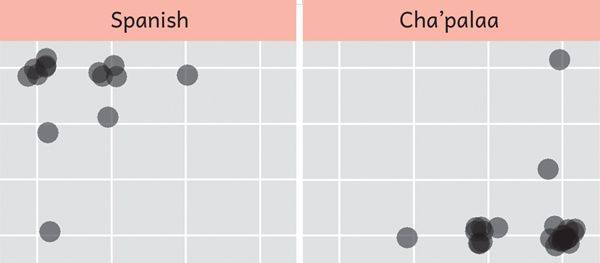
International Phonetic Association / CC-BY-SA
Some researchers have proposed that interjections like Huh? are not real words, but are grunts of some kind. But if Huh? were just an animal-like signal of surprise, then it should not differ systematically in these (albeit minor) ways. The vowels used in the Spanish and Cha’palaa versions of Huh? are different enough from each other that Cha’palaa children must be learning to say the word differently from the way that Spanish children do. The local version of Huh? is specifically shaped to the language. It is a real word, not a grunt. It is incorporated into the local language system.
To say that this word varies in form depending on the language system in which it is embedded is not inconsistent with saying that it is universal. All humans are capable of producing the same wide range of vowel sounds. In both Spanish and Cha’palaa we see that Huh? always occurs with a vowel in the open-front corner of the vowel possibility space. The figure below makes the same point, this time with each of the languages from our 10-language study plotted at the average point at which all the examples of Huh? from that language landed.
There is a remarkable convergence across the languages here. Although there is indeed some variation in the precise point at which this word is pronounced in each language (as just described for Cha’palaa and Spanish), the vowel of the Huh? word in these languages shows much less variation across languages than would normally be expected for a random word. It never lands in a high or back area of the vowel space. It is always found in the lower-front corner of the space.
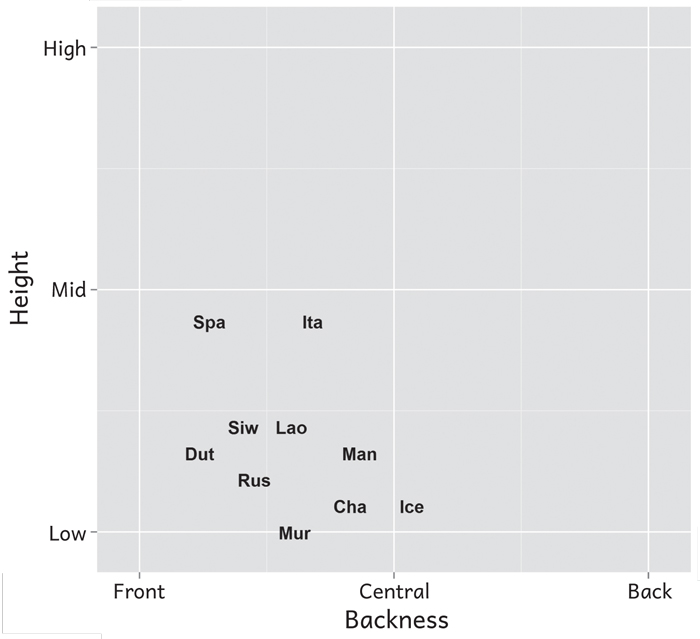
International Phonetic Association / CC-BY-SA
When Dingemanse, Torreira, and I argue that Huh? is universal, we mean that in all the languages we’ve investigated or heard about so far, there is a word that sounds like Huh? and means the same thing. We can be proven wrong. But we are confident that the word is universal because the languages we sampled come from a broad range of different language families.
It would have been no good checking for a universal on the basis of languages from the same language family (for example, Russian, Italian, German, French, Spanish, and English, which are all Indo-European languages) because those languages have a single common ancestor. Maybe the “universal” feature in question was a rare innovation that occurred once in history, in just that ancestor language, and all the modern descendants simply inherited it from the same source. Nineteenth-century English polymath Sir Francis Galton pointed out this problem in his commentary on the work of his contemporary, the anthropologist Edward Tylor, insisting on the need to ensure that the individuals in a sample are independent. In linguistics, this standard means that if we are going to claim that something is universal, we had better test languages in a sample that includes as many language families as possible.
In our study, we had data from 31 languages in total, and these derived from 16 distinct language families. This sample represents only a fraction of the world’s languages, but in practice, a sample of this size and kind is sufficient to falsify many possible claimed universals. If Huh? were not universal in the sense we claim, chances are high that at least one of the 31 languages would lack it.
The discovery of a universal word is not what received wisdom in linguistics would predict. A century ago, the Swiss linguist and semiotician Ferdinand de Saussure established the doctrine of the arbitrariness of the sign. His example of a sign was the word tree. The sign has two parts. One part is a sound. In his example it is the sound we make when we pronounce the word tree. The other part is a concept, something like what we think of when we hear someone say tree. The arbitrariness of the sign refers to the link between a sound and a concept. Saussure said that this link was entirely arbitrary. It is the result of historical accident in a language. There is no significance to the fact that the English word tree has the sound that it does. Basically, the same concept is connected with completely different sounds in other languages, by sheer convention: baum in German, ton-mai in Thai, kaspi in Amazonian Quechua, and so on.
Obvious exceptions to the rule are imitative or onomatopoeic words, including plop, quack quack, and cock-a-doodle-doo. But these are not as similar across languages as you might expect. Speakers of the Lao language say djoum, gaap gaap, and oki ok ok for these meanings. The sounds of these words are arbitrary in the sense that they can be quite different from language to language. But they are motivated. When you learn the word, you can immediately see a sensible connection between the sound and the meaning. Quack quack sounds something like what a duck says. And so does gaap gaap.
The vowels of Huh? words show much less variation across languages than would normally be expected for a random word.
Then there are more subtle cases of sound linking to meaning in motivated ways. Here are two more examples from Lao. If you ah your mouth, it means that you open it up wide (“Say Ah!”). And if you mim your mouth, it means you press the lips tightly together. The sounds of these words connect to the words’ meanings through the actions that are required for pronouncing them. For reasons like these, unrelated languages sometimes have similar-sounding words for similar meanings. If a word is uncannily similar across unrelated languages, it may be because there is a common motivation for languages to independently evolve such a form.
Along these lines, Dingemanse, Torreira, and I argue that Huh? is the product of convergent evolution. This term refers to the independent evolution of similar structures in unrelated species. For example, dolphins (a species of mammal) have independently evolved very similar body shapes to sharks (a species of fish), and they have independently evolved similar systems of echolocation to those used by bats. Convergent evolution occurs when two species respond in similar ways to similar environmental pressures.
Huh? has a similar form across languages because the same set of conditions leads in all languages to something like the Huh? word being produced. In the flow of conversation, people need to be sure that others know when they have failed to understand. Time runs by quickly in conversation, and there is only a short window in which to signal a comprehension problem. In that situation, one needs a syllable that is fast and easy to pronounce. Huh? does the job. The particular vowels that Huh? is restricted to in all languages happen to be the vowels that are most easily pronounced when a person’s tongue is in a relaxed position.
Think about the conditions a person is under in conversation. First, not only are people capable of responding to what others say within the time it takes a sprinter to react to the starter’s gun, but there is a social expectation that they will do so. Second, there is a social preference not to hold up the conversation by requiring others to go back and revise. It is better to avoid initiating repair. Third, there is a further preference—which competes with the preceding one—for ensuring that problems in common understanding do not pass by unresolved.
Ideally in conversation a person hears and understands everything the other person said, so these preferences do not come into conflict. But when a person finds that they have failed to hear or understand what someone just said, there is a dilemma. Time is passing quickly. To avoid halting proceedings, a person might first try hard to process or reconstruct what they have heard. But with every passing millisecond, any delay in response increases the risk of adverse consequences. For example, a delay can be interpreted as a negative response to what was just said rather than simply a sign of the inability to respond.
Once a delay becomes too long, and especially when it begins to extend beyond the 600-millisecond mark, creeping into the late zone of the one-second window for turn transition, a speaker needs to act fast. The thinking process goes something like this: “I’ve tried to process this communication but have failed to do so in the time I had; now it’s getting late, and the other person will either keep going, unaware that I haven’t understood, or they will assume I’m unhappy with what they’ve said; now I need to make a sign quickly.” By this point, the speaker needs to launch a recognizable sign as fast as humanly possible and with minimum effort. It takes a good 600 milliseconds to go through the mental processes of finding a specific word and instigating a specific motor program for articulating that word. The advantage of the sound of Huh? is that it requires a minimum of motor planning and execution. With the tongue in a neutral and relaxed state, and with the mouth slightly open, a person needs only to make a vocal sound with some force, and the sound that will come out is Huh?

Luciano Leon/Alamy Stock Photo
The fact that Huh? can be uttered with minimal delay does not mean that the word will be faster than other kinds of responses. Research on English shows that Huh? is heard on average after a delay of 835 milliseconds, much later than the average turn transition of around 200 milliseconds (and indeed later than strong repair initiators, which come after an average pause of 726 milliseconds). One reason why Huh? is both fast to produce and late to arrive is that the speaker will often have used up time trying to process or reconstruct what they just heard. Upon failing to do so, even a very fast production time will still leave them in the late zone of the one-second window. Better late than never!
My colleagues’ and my claim that Huh? is the product of convergent evolution posits that the same solution to the problem arose in all languages because all languages share a common environment: a high-speed, forward-feeding system of turn transition in which participants are accountable for keeping up. Huh? sounds the same across languages because that particular sound is best fitted to the word’s universal function: the need to signal as quickly and simply as possible that there is a general problem.
When we reported our finding that Huh? is a universal word in human languages, people liked the irony of it: “One of the few things that cultures share is a sign of misunderstanding and confusion.” But Huh? does not stand for universal confusion. It stands for universal cooperation. It shows that there is a global need, and willingness, to pause a conversation and sort out a communication problem as it occurs.
This little word, like the turn-taking system in which it operates, suggests a moral architecture to communication. The word makes sense only when one can assume that the other person will cooperate by backing up and repeating what they said, thus helping the listener stay on track. This cooperation is possible because conversation involves joint commitment, and the interpersonal accountability that goes with it. And it explains why no other species goes Huh? or does anything like it, even when their communication systems are complex.
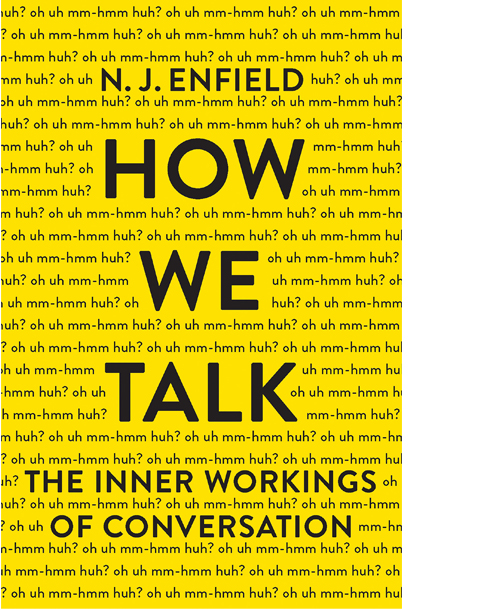
If the complexity of the signal were the key point, it would be surprising that no other animal goes Huh? The word has none of the complex grammatical structure that defines human language. Indeed, it has no grammatical structure at all. But Huh? is possible only when an ultraflexible system such as language, with ultracooperative users, demands and supplies a solid and readily available backup mechanism for ensuring intersubjectivity at every step.
Click "American Scientist" to access home page
American Scientist Comments and Discussion
To discuss our articles or comment on them, please share them and tag American Scientist on social media platforms. Here are links to our profiles on Twitter, Facebook, and LinkedIn.
If we re-share your post, we will moderate comments/discussion following our comments policy.